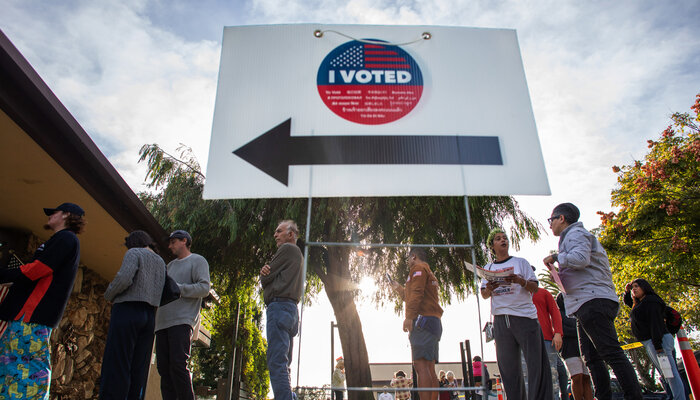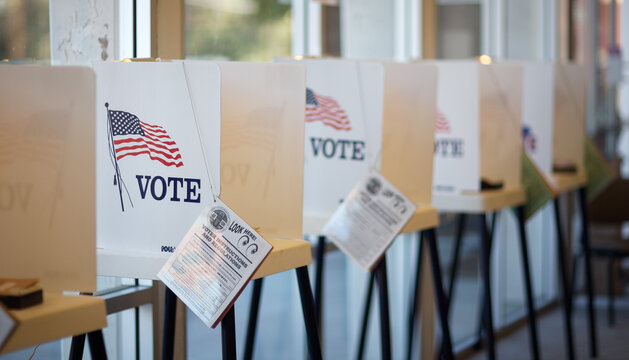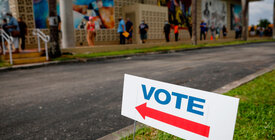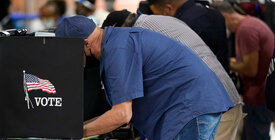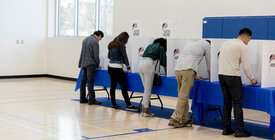
Click here for the most recent State Voting Laws Roundup >>
State governments in 2025 are nearly on pace to match the number of restrictive voting laws enacted in 2021, when states enacted more restrictive legislation than at any other point so far in the 14 years the Brennan Center has tracked state voting legislation. That year, driven in large part by lies about the 2020 election being stolen, state legislatures passed an unprecedented number of laws that limited access to voting. Through 2024, that number declined but never returned to pre-2021 levels.
The 2024 election results were not subject to the same level of skepticism or conspiracy theories as the 2020 election. Nonetheless, despite the absence of a losing presidential candidate pushing myths that the most recent national election was incorrectly decided, state legislatures continue to enact restrictive voting laws at a significant pace. The push to tighten voting access appears to be not just a one-time spike resulting from a hotly contested election but an agenda that persists across election cycles regardless of recent outcomes. As of early October 2025, the number of states (16) that have enacted restrictive laws and the total number of restrictive laws (29) are just about on par with the year-end total from the record-setting 2021 (32 laws in 17 states), and more than 2023, when at least 14 states passed 17 restrictive laws.1With more than two months left in the year, more laws could pass, including in North Carolina, where a broad election bill is progressing.
However, one significant difference from 2021 is the lack of “omnibus” restrictive laws that make voting harder in multiple ways. Each restrictive law counts only once, but some of them create a single narrow burden while others contain several provisions that may adversely affect a relatively large percentage of voters in the state. No single new law this year has as sweeping a slate of restrictions as individual laws passed in Florida, Georgia, Iowa, and Texas in 2021. Nonetheless, each of these 29 laws establishes new hurdles for some or all people to vote (many voting laws pass each year that do not meet our criteria for restrictive, interference, or expansive, and we generally do not report on those).
Another substantial change from recent years is that state legislatures have not enacted significantly more expansive voting legislation than restrictive laws, with only 30 expansive laws enacted as of October 6. In each year from 2021 through 2024, expansive voting laws outnumbered restrictive ones by at least 1.5 times (in 2023, the ratio of expansive to restrictive laws was more than 3 to 1). While there are a handful of legislatures still in session, the 30 expansive laws enacted this year are far fewer than the 53 enacted in 2023 and 62 in 2021. The pace of democratic progress in many states has slowed just as democratic backsliding has accelerated in others.
Key takeaways from our analysis of state voting legislation between January 1, 2025, and October 6, 2025, include:
- At least 16 states2have enacted 29 restrictive voting laws so far this year.3That’s 1 state and 3 laws short of the 2021 record. That year, 17 states passed 32 restrictive laws, marking the highest total in the 14 years the Brennan Center has been tracking such legislation. Eleven of the states that enacted restrictive voting laws in 2021 also enacted restrictive voting laws this year.4
- All 29 restrictive laws are set to be in effect for the 2026 midterms, except for some parts of Utah’s omnibus law.5
- So far in 2025, 47 state legislatures have considered at least 469 restrictive bills,6and 20 of those bills are still moving through legislatures whose 2025 sessions remain open. Around this time in 2021, 49 states had introduced at least 425 restrictive bills.
- At least 7 states7enacted 8 election interference laws, all of which are set to be in effect before the 2026 midterms.8Many of the laws give partisan state-level actors unprecedented authority over voting and election processes.
- At least 25 states9enacted 30 expansive voting laws, all of which are set to be in effect before the 2026 midterms.10At least 14 of those states also passed at least 1 restrictive or interference law. This means 11 states enacted expansive voting legislation alone, accounting for at least 19 expansive laws.
Notable Trends
Six legislatures enacted laws requiring or allowing election officials to remove people from the voter rolls for additional reasons.11Keeping the voter rolls up to date — a process known as voter list maintenance — is an essential function of election officials, but some of these new laws fail to incorporate safeguards to prevent eligible, properly registered citizens from being wrongly removed. State officials are already required to conduct voter list maintenance by federal law, and there is no evidence of widespread registration or voting by ineligible people.
Another key trend is the dearth of new restrictive laws related to citizenship and voting. As we reported in June, although dozens of states are considering laws that would require some or all voters to present a birth certificate or passport to vote, only Indiana and Wyoming have passed such laws. The national version of this policy, known as the SAVE Act, has stalled in the Senate and an effort by President Trump to impose this policy through executive order has been blocked in the courts. Brennan Center research on show-your-papers policies finds that they would block millions of American citizens from voting, upend existing voter registration systems, and create major challenges for local election officials.
Additionally, several states will ask voters to consider election-related ballot questions in 2025 or 2026. Ballot initiatives aren’t included in our count of state voting laws, although some ballot initiatives originate from legislative resolutions that we do include in the count.
Endnotes
-
1
Legislatures vary in the frequency and length of their sessions. Forty-six meet every year, four meet in only odd-numbered years, and some hold shorter sessions in even-numbered years than in odd-numbered years, although the exact count varies from cycle to cycle.
-
2
Arkansas, Florida, Idaho, Indiana, Kansas, Kentucky, Montana, North Dakota, Ohio, Oklahoma, South Dakota, Tennessee, Texas, Utah, West Virginia, and Wyoming.
-
3
Legislation is categorized as restrictive if it contains one or more provisions that would make it harder for eligible Americans to register, stay on the voter rolls, or vote compared to existing state law.
-
4
Arkansas, Florida, Idaho, Indiana, Kansas, Kentucky, Montana, Oklahoma, Texas, Utah, and Wyoming.
-
5
Additionally, some laws already face lawsuits and may be blocked by court orders.
-
6
Hawaii, Louisiana, and Vermont are the exceptions. Vermont was also the only state not to introduce a restrictive bill in 2021, and Vermont, Delaware, and Kentucky were the 3 not to do so in 2023. Louisiana is, however, one of 7 states that have enacted election interference legislation so far this year (LA H.B. 502).
-
7
Indiana, Iowa, Kansas, Louisiana, New Hampshire, Texas, and Utah.
-
8
Legislation is categorized as interference if it either threatens the people and processes that make elections work or increases opportunities for partisan interference in election results or administration.
-
9
Arkansas, California, Colorado, Connecticut, Hawaii, Idaho, Iowa, Kentucky, Maine, Maryland, Nevada, New Hampshire, New Jersey, North Dakota, Ohio, Oklahoma, Rhode Island, South Dakota, Tennessee, Texas, Utah, Virginia, Washington, West Virginia, and Wyoming.
-
10
Legislation is categorized as expansive if it contains one or more provisions that would make it easier for eligible Americans to register, stay on the voter rolls, or vote as compared to existing state law.
-
11
Indiana, Kansas, Montana, Tennessee, Utah, and West Virginia.
